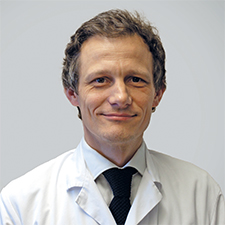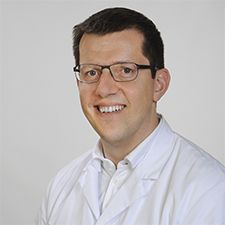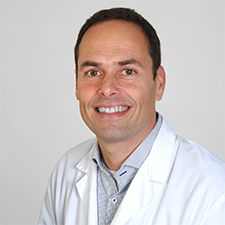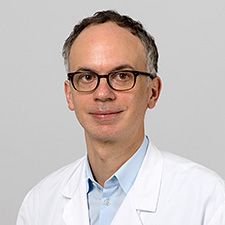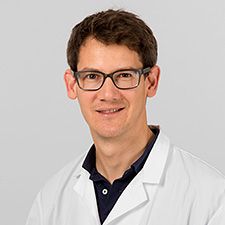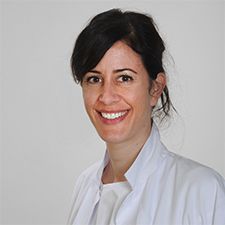Acute lymphoblastic leukemia
Acute lymphoblastic leukemia (ALL) is a rare, malignant disease of the bone marrow with an annual incidence rate of around 1.5/100,000 people in all age groups. In adults, it is around ten times rarer than acute myeloid leukemia (AML).
In ALL, too many immature (abnormal) lymphocytes are formed in the bone marrow, which then become visible in the blood as leukemia cells. In the bone marrow, these cells hinder the production of other healthy blood cells, which then leads to the symptoms of leukemia, such as anemia, susceptibility to infection and a tendency to bleed.
There are many subtypes of ALL. Depending on the type of ALL and other medical criteria (the patient’s age, general condition and other factors), the best treatment strategy is determined, usually with the aim of achieving a cure. It is carried out in modern, international therapy studies (currently the GRAALL 2014 study) based on the latest scientific findings.
Depending on the situation, a subsequent blood stem cell transplant may be useful to further increase the chances of recovery.
Depending on the case, state-of-the-art bispecific antibodies are used to improve the chances of recovery before transplantation. These can also occasionally be used successfully in the event of a relapse.
In the last two years, around 50 patients with new-onset ALL have been treated at our center.
Acute myeloid leukemia
With an annual incidence of 2-3 patients per 100,000 inhabitants, AML is a rare disease overall, although it increases significantly to 15 to 25 per 100,000 in the growing age group of 70-85 year-olds.
The historical name AML comes from the connecting element of the sudden onset (in the middle of life) and the impressive proliferation of white blood precursor cells in the blood in most cases. The disease is usually characterized by the deficiency of the three cellular elements of the blood – stress weakness and fatigue due to anemia, infection as a result of non-functioning immune cells and bleeding due to thrombocytopenia/dysfunction of blood clotting.
Today, we recognize that AML is a complex multitude of sub-diseases with very different treatment responses and cure rates.
The Department of Hematology is one of the largest centers in Switzerland for the complex and specific diagnosis and treatment of these diseases. In the period between 2010 and 2012, >150 patients with AML were treated directly in our clinic. We offer comprehensive and rapid clarification and, if necessary, the entire spectrum of outpatient and inpatient treatment options for patients of all ages. The therapy includes, among other things:
- Modern chemotherapy in accordance with the latest international standards
- High-dose therapy with subsequent autologous (patient’s own) blood stem cell transplantation
- Allogeneic related or unrelated blood stem cell transplantation
- Supportive measures including transfusion of blood products
In addition to clinical care, we are also working on the development and treatment of AML in the university’s scientific laboratory.
Chronic myeloid leukemia
Chronic myeloid leukaemia (CML) belongs to the group of myeloproliferative neoplasms (MPNs), which are characterized by an uncontrolled proliferation of certain cells in the blood. In the case of CML, there is an increase in white blood cells (leukocytes) in particular. In contrast to acute leukemia, however, the cells are usually fully functional. For this reason, many patients are diagnosed as an incidental finding during a routine blood count check without any specific symptoms of the disease. In another group of patients, however, CML is diagnosed on the basis of certain symptoms such as fatigue, night sweats or abdominal pain due to an enlarged spleen: Fatigue, fever, night sweats or abdominal pain due to an enlarged spleen.
However, if left untreated, CML will develop into acute leukemia (blast crisis) after a few years. For this reason, the primary goal of CML therapy is to prevent a blast crisis.
In our clinic, we can reliably diagnose CML using the latest methods in hematological diagnostics and in collaboration with the pathologists at the USZ, and monitor the response to therapy very closely during the course of treatment.
Today, so-called tyrosine kinase inhibitors are used for the treatment of CML. These drugs allow targeted treatment of the leukemia cells with good overall tolerability. Fortunately, we now have access to up to 5 different tyrosine kinase inhibitors for the treatment of CML. The medication is used after a precise diagnosis (stage of the disease and any previous therapies) and clinical evaluation of the patient with regard to other concomitant diseases. Depending on the results, the most suitable medication is then selected.
We are also taking part in clinical trials to improve the treatment of CML. Our clinic is currently conducting studies on the treatment of newly diagnosed CML and also on therapy after the failure of standard therapy (relapse therapy).
